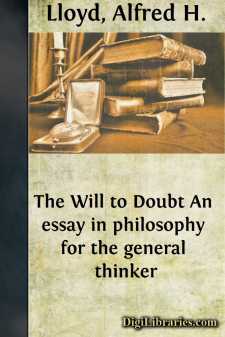Categories
- Antiques & Collectibles 13
- Architecture 36
- Art 48
- Bibles 22
- Biography & Autobiography 813
- Body, Mind & Spirit 142
- Business & Economics 28
- Children's Books 15
- Children's Fiction 12
- Computers 4
- Cooking 94
- Crafts & Hobbies 4
- Drama 346
- Education 46
- Family & Relationships 57
- Fiction 11828
- Games 19
- Gardening 17
- Health & Fitness 34
- History 1377
- House & Home 1
- Humor 147
- Juvenile Fiction 1873
- Juvenile Nonfiction 202
- Language Arts & Disciplines 88
- Law 16
- Literary Collections 686
- Literary Criticism 179
- Mathematics 13
- Medical 41
- Music 40
- Nature 179
- Non-Classifiable 1768
- Performing Arts 7
- Periodicals 1453
- Philosophy 64
- Photography 2
- Poetry 896
- Political Science 203
- Psychology 42
- Reference 154
- Religion 513
- Science 126
- Self-Help 84
- Social Science 81
- Sports & Recreation 34
- Study Aids 3
- Technology & Engineering 59
- Transportation 23
- Travel 463
- True Crime 29
The Will to Doubt An essay in philosophy for the general thinker
by: Alfred H. Lloyd
Description:
Excerpt
PREFACE.
The chapters that follow comprise what might be called an introduction to philosophy, but such a description of them would probably be misleading, for they are addressed quite as much to the general reader, or rather to the general thinker, as to the prospective student of technical philosophy. They are the attempt of a University teacher of philosophy to meet what is a real emergency of the day, namely, the doubt that is appearing in so many departments of life, that is affecting so many people, and that is fraught with so many dangers, and in attempting this they would also at least help to bridge the chasm between academic sophistication and practical life, self-consciousness and positive activity. With peculiar truth at the present time the University can justify itself only by serving real life, and it can serve real life, not merely by bringing its pure science down to, or up to, the health and the industrial pursuits of the people, but also by explaining, which is even to say by applying, as science is "applied," or by animating the general scepticism of the time.
That this scepticism is often charged to the peculiar training of the University hardly needs to be said, but except for its making such an undertaking as the present essay only the more appropriate the charge itself is strangely humorous. One might also accuse the University of making atoms and germs, or, by its magic theories, of generating electricity or disease. Scepticism is a world-wide, life-wide fact; even like heat or electricity, it is a natural force or agent—unless forsooth one must exclude all the attitudes of mind from what in the fullest and deepest sense is natural; scepticism, in short, is a real phase of whatever is real, and its explanation is an academic responsibility. Its explanation, however, like the explanation of everything real or natural, can be complete only when, as already suggested here, its application and animation have been achieved, or when it has been shown to be properly and effectively an object of will. So, just as we have the various applied sciences, in this essay there is offered an applied philosophy of doubt, a philosophy that would show doubt to have a real part in effective action, and that with the showing would make both the doubting and the acting so much the more effective.
But it may be said that effective acting depends, not on doubt, but rather on belief, on confidence or "credit." This will prove to be true, excepting in what it denies. To be commonplace, to write down here and now what is at once the truism and the paradox of this book, a vital, practical belief must always live by doubting. Was it Schopenhauer who declared that man walks only by saving himself at every step from a fall? The meaning of this book is much the same, although no pessimism is either intended or necessarily implied in such a declaration. Doubt is no mere negative of belief; rather it is a very vital part of belief, it has a place in the believer's experience and volition; the doubters in society, be they trained at the University or not, and those practical creatures in society who have kept the faith, who believe and who do, are naturally and deeply in sympathy....


